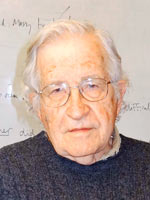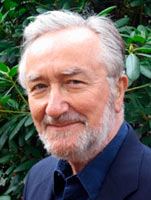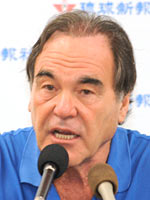International scholars and peace advocates support Okinawan struggle to oppose the Henoko landfill

Noam Chomsky
January 8, 2014 Ryukyu Shimpo
On January 8, leading scholars, peace advocates and artists from the United States, Canada, Europe, and Australia released a statement opposing the construction of a new US military base within Okinawa. The statement urges, “support the people of Okinawa in their struggle for peace, dignity, human rights and protection of the environment.” It calls for the plan to relocate the Futenma base to Henoko to be canceled and to return the base immediately to the people of Okinawa.
Initial signers of the statement include linguist Noam Chomsky, Academy Award-winning filmmaker Oliver Stone and Mairead Maguire, Nobel peace laureate who was awarded the Nobel Peace Prize for her work for peace and a nonviolent solution to the conflict in Northern Ireland. It is for the first time that so many influential people in the world have released a statement on the Futenma base issue.
There are also many other names given, such as John W. Dower, professor emeritus of history at Massachusetts Institute and Pulitzer Prize winner, Ann Wright, retired US Army Colonel and former US diplomat, Richard Falk, professor emeritus of International Law at Princeton University and the United Nations Special Rapporteur on Palestinian human rights, Daniel Ellsberg, Senior Fellow at the Nuclear Age Peace Foundation, Gavan McCormack, professor emeritus of the Australian National University who was awarded the Ryukyu Shimpo Ikemiyagi Shui Prize for promotion of international understanding of Okinawa and Canadian author and journalist Naomi Klein.
“We the undersigned oppose the deal made at the end of 2013 between Prime Minister Shinzo Abe and Governor of Okinawa Hirokazu Nakaima to deepen and extend the military colonization of Okinawa at the expense of the people and the environment,” the statement said. It mentioned the polls in recent years have been showing that 70 to 90 percent of the people of Okinawa opposed the Henoko base plan, and pointed out that “Governor Nakaima’s reclamation approval does not reflect the popular will of the people of Okinawa.” “The reclamation approval was a betrayal of the people of Okinawa,” the statement criticized the governor for breaking his election pledge to move the Futenma base outside the prefecture. “The base should have been returned to its owners after the war,” the statement said about the U.S. military stationed on the islands and the burden on the people since the war ended. The statement said, referring to the Futenma base, “any conditional return of the base is fundamentally unjustifiable.” It pointed out, referring to the approval of the landfill, “The new agreement would also perpetuate the long suffering of the people of Okinawa.”
Speaking for the signers, Joseph Gerson, director of the Peace and Economic Security Program for the American Friends Service Committee, said the statement is intended to “rally international support for Okinawans in their inspiring and essential nonviolent campaign to end seventy years of military colonization, to defend their dignity and human rights, and to ensure peace and protect their environment.”
(English translation by T&CT)
Statement Follows:
STATEMENT
We oppose construction of a new US military base within Okinawa, and support the people of Okinawa in their struggle for peace, dignity, human rights and protection of the environment
We the undersigned oppose the deal made at the end of 2013 between Prime Minister Shinzo Abe and Governor of Okinawa Hirokazu Nakaima to deepen and extend the military colonization of Okinawa at the expense of the people and the environment. Using the lure of economic development, Mr. Abe has extracted approval from Governor Nakaima to reclaim the water off Henoko, on the northeastern shore of Okinawa, to build a massive new U.S. Marine air base with a military port.
Plans to build the base at Henoko have been on the drawing board since the 1960s. They were revitalized in 1996, when the sentiments against US military bases peaked following the rape of a twelve year-old Okinawan child by three U.S. servicemen. In order to pacify such sentiments, the US and Japanese governments planned to close Futenma Marine Air Base in the middle of Ginowan City and move its functions to a new base to be constructed at Henoko, a site of extraordinary bio-diversity and home to the endangered marine mammal dugong.
Governor Nakaima’s reclamation approval does not reflect the popular will of the people of Okinawa. Immediately before the gubernatorial election of 2010, Mr. Nakaima, who had previously accepted the new base construction plan, changed his position and called for relocation of the Futenma base outside the prefecture. He won the election by defeating a candidate who had consistently opposed the new base. Polls in recent years have shown that 70 to 90 percent of the people of Okinawa opposed the Henoko base plan. The poll conducted immediately after Nakaima’s recent reclamation approval showed that 72.4 percent of the people of Okinawa saw the governor’s decision as a “breach of his election pledge.” The reclamation approval was a betrayal of the people of Okinawa.
73.8 percent of the US military bases (those for exclusive US use) in Japan are concentrated in Okinawa, which is only 0.6 percent of the total land mass of Japan. 18.3 percent of the Okinawa Island is occupied by the US military. Futenma Air Base originally was built during the 1945 Battle of Okinawa by US forces in order to prepare for battles on the mainland of Japan. They simply usurped the land from local residents. The base should have been returned to its owners after the war, but the US military has retained it even though now almost seven decades have passed. Therefore, any conditional return of the base is fundamentally unjustifiable.
The new agreement would also perpetuate the long suffering of the people of Okinawa. Invaded in the beginning of the 17th century by Japan and annexed forcefully into the Japanese nation at the end of 19th century, Okinawa was in 1944 transformed into a fortress to resist advancing US forces and thus to buy time to protect the Emperor System. The Battle of Okinawa killed more than 100,000 local residents, about a quarter of the island’s population. After the war, more bases were built under the US military occupation. Okinawa “reverted” to Japan in 1972, but the Okinawans’ hope for the removal of the military bases was shattered. Today, people of Okinawa continue to suffer from crimes and accidents, high decibel aircraft noise and environmental pollution caused by the bases. Throughout these decades, they have suffered what the U.S. Declaration of Independence denounces as “abuses and usurpations,” including the presence of foreign “standing armies without the consent of our legislatures.”
Not unlike the 20th century U.S. Civil Rights struggle, Okinawans have non-violently pressed for the end to their military colonization. They tried to stop live-fire military drills that threatened their lives by entering the exercise zone in protest; they formed human chains around military bases to express their opposition; and about a hundred thousand people, one tenth of the population have turned out periodically for massive demonstrations. Octogenarians initiated the campaign to prevent the construction of the Henoko base with a sit-in that has been continuing for years. The prefectural assembly passed resolutions to oppose the Henoko base plan. In January 2013, leaders of all the 41 municipalities of Okinawa signed the petition to the government to remove the newly deployed MV-22 Osprey from Futenma base and to give up the plan to build a replacement base in Okinawa.
We support the people of Okinawa in their non-violent struggle for peace, dignity, human rights and protection of the environment. The Henoko marine base project must be canceled and Futenma returned forthwith to the people of Okinawa.
January 2014
Norman Birnbaum, Professor Emeritus, Georgetown University
Herbert Bix, Emeritus Professor of History and Sociology, State University of New York at Binghamton
Reiner Braun, Co-president International Peace Bureau and Executive Director of International Association of Lawyers Against Nuclear Arms
Noam Chomsky, Professor Emeritus of Linguistics, Massachusetts Institute of Technology
John W. Dower, Professor Emeritus of History, Massachusetts Institute of Technology
Alexis Dudden, Professor of History, University of Connecticut
Daniel Ellsberg, Senior Fellow at the Nuclear Age Peace Foundation, former Defense and State Department official
John Feffer, Co-director of Foreign Policy In Focus (www.fpif.org) at the Institute for Policy Studies
Bruce Gagnon, Coordinator of the Global Network Against Weapons & Nuclear Power in Space
Joseph Gerson (PhD), Director, Peace & Economic Security Program, American Friends Service Committee
Richard Falk, Milbank Professor of International law Emeritus, Princeton University
Norma Field, Professor Emerita, East Asian Languages and Civilizations, University of Chicago
Kate Hudson (PhD), General Secretary, Campaign for Nuclear Disarmament.
Catherine Lutz, Professor of Anthropology and International Studies, Brown University
Naomi Klein, Author and journalist
Joy Kogawa, Author of Obasan
Peter Kuznick, Professor of History, American University
Mairead Maguire, Nobel Peace laureate
Kevin Martin, Executive Director, Peace Action
Gavan McCormack, Professor Emeritus, Australian National University
Kyo Maclear, author of Virginia Wolf
Steve Rabson, Professor Emeritus, Brown University/ Veteran, United States Army, Henoko, Okinawa, 1967-68
Mark Selden, a Senior Research Associate in the East Asia Program at Cornell University
Oliver Stone, Filmmaker
David Vine, Associate Professor of Anthropology, American University
The Very Rev. the Hon. Lois Wilson, former President, World Council of Churches
Lawrence Wittner, Professor Emeritus of History, State University of New York/Albany
Ann Wright, Retired US Army Colonel and former US diplomat
(In the alphabetical order of family names, as of January 7, 2014)
Previous Article:Kinkomokuzetsu: Enlisting the power of water
Next Article:People make it a New Year’s resolution to protect landscape of Henoko
[Similar Articles]
- NGO Human Rights Now criticizes Japanese government for blocking protesters in Henoko and Takae
- Ryukyu Shimpo Ikemiyagushiku Shui Award goes to group that released 2014 Okinawa statement
- Kenzaburo Oe and 23 other artists and intellectuals release statement supporting governor’s revocation of Henoko land reclamation permit
- Gov. Onaga gives speech at UN calling for stop to US Henoko base construction
- Students appeal to the UN Council that concentrating U.S. bases in Okinawa is a violation of human rights


 Webcam(Kokusai Street)
Webcam(Kokusai Street)


